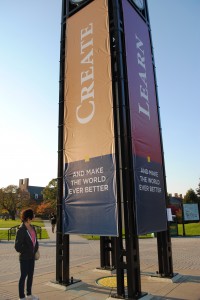
Freshman Alison Madnick observed the banners on the clocktower in Dandelion Square, which tout the four tenets of the Meliora Challenge. Elizabeth Brown, Staff Photographer.
UR launched the public phase of its largest capital campaign in history, The Meliora Challenge, on Oct. 21. The campaign, which was officially launched during Meliora Weekend, aims to raise $1.2 billion by June of 2016. The private portion of the campaign, which began in 2005, has amassed $759 million so far.
The money will go toward five factions of the University. $375 million will be allocated to programs, $350 million to faculty, $225 million to students, $130 million to the annual fund, and $120 million to facilities.
According to Dean of the College Richard Feldman, it will allow “the college and the campus to see changes and improvements steadily over time as the campaign moves along.”
One aspect of the Meliora Challenge will focus on increased access to research. Professor of Physics and Director of Undergraduate Research Steven Manly already has plans for improvement.
“I have a lot of ideas for ways in which gifts can help undergraduate research,” he said. Manly would like to see funding for the continuation of research projects in the summer months and a visible undergraduate research prize for mentors. He would also like to create an easier way for undergradua-tes to start research.
The creation of scholarship is another feature of the the Meliora Challenge.
“There are some new specific, named scholarships from many generous individuals, including many alumni and members of our Board of Trustees,” Dean of Admissions and Financial Aid Jonathan Burdick explained. Burdick is pleased that the increased funding will allow the University to reach more students in need. He also hopes that it will help reduce the debt students incur whil attending the University. This will “[ensure] that qualified students from every financial background are able to attend Rochester,” he said.
The Meliora Challenge also highlights a future $100 million children’s hospital at the UR Medical Center.
The new hospital will improve patient care, research and education, specifically in the fields of cancer, neonatology, autism, eating disorders, cardiovascular disease, surgery and supportive care.
Thus far, responses to the initiatives of the Meliora Challenge have generally been positive.
Biomedical Engineering Chair and professor Richard Waugh believes that the campaign’s effects on the University point toward good things for the biomedical engineering department.
“A rising tide lifts all boats,” he said. “I think more wealth in the school is a good thing for everyone.” As part of the campaign he would like to see new professorships in the biomedical engineering department.
A strong faculty is a desire shared by Chair of the Department of Political Science and associate professor Gretchen Helmke.
“Meeting the Meliora Challenge will allow us to continue to attract and retain top faculty and to support our outstanding graduate program,” she said.
Administrators are not the only ones weighing in on these new initiatives, however. Many current students do not believe that the campaign will personally affect them any time soon.
Feldman admits that the campaign will not mean much to current seniors, though it will mean more to freshmen. Many of the goals are intended for the future of the University rather than the present. “I want to be clear about the time horizon on this — it’s not all short-term,” Feldman said.
Nonetheless, current students have ideas about where they would like the funds from this campaign to go.
Junior Victoria Pietruszka would like to see money going to help students personally. “Being a Writing Fellow I see a lot of students come in with transfer essays, not because they want to leave, but because they’ve maxed out on their loans,” she said. “I would really like to see it go towards relieving the financial burden of students.”
Freshman Ashwini Mandalika believes that more money should go toward academics.
“I think all the academic departments in general should get more money,” she said. “The music department needs a little bit of help because usually I’ve seen a lot of resources focused on Eastman. Rochester’s actual music department, I feel, is neglected,” she said. These desires, according to Feldman, will be met by the creation of new facilities for student activities such as music, theater, dance and athletics.
Mandalika also saw potential downsides.
“I hope that a goal that’s supposed to be reached in five years doesn’t make them neglect their duties,” Mandalika said.
Feldman, however, disagrees.
“The returns on the work will be well worth it,” he said. “I am confident that the goals will be met and it will make a difference.”
Hansler is a member of
the class of 2015.
